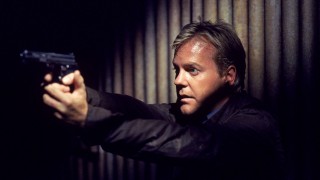Joel Surnow and Robert Cochran have a long track record of writing and creating successful network shows. Their credits include Falcon Crest, Miami Vice and The Equalizer. They are the executive producers — along with Academy Award winners Ron Howard and Brian Grazer — of 24, this season’s most talked about and critically acclaimed series, which airs on FOX.
How has prime-time television changed since the days of Falcon Crest and Miami Vice?
SURNOW: Cable has become more prominent and pay channels like Showtime and HBO have raised the stakes over the past several years. There are hundreds of shows to choose from at any given time and the competition is such that whatever is airing has to be able to hold a viewer’s attention.
COCHRAN: Shows have to perform more quickly now. They are given less time to find an audience than they were before. Everything is so competitive. You probably don’t have to find as big an audience as you used to. With audiences fragmenting, you must find an audience that works, it doesn’t have to be huge — as long as it’s fairly homogenous and advertisers can be assured that the target demo they want is going to be there.Because the viewer has so many entertainment options today, have you had to change your way of telling stories for television?
COCHRAN: That’s a good question. I do think what’s changed — not only in TV — is the sense that our lives are paced more quickly than they were 20 or 30 years ago. If you watch a TV show from the ’50s, the storytelling pace is slower — not necessarily boring — but things take more time to unfold. They spend more time on little moments and you wouldn’t do much of that now. I don’t think that’s a good thing or a bad thing, but the pace has changed. You have to keep things moving along more quickly, particularly in hour-long episodic television. Especially in a cop show or action show, the pace has got to be picked up compared to what things were like in the past.How did the idea for 24 come about?
COCHRAN: [Laughs] Joel called me one day. He didn’t have any stories or characters in mind. But he had the notion that 22 episodes is the usual order [from a network], and there are 24 hours in a day, and those two numbers are pretty close. What if we did a show with 24 episodes instead of 22, and each episode takes place in an hour of the same day? My first reaction was, That’s very clever, but it’s impossible. It can’t be done and I don’t want to think about that. He called me back a couple days later and said, “Look, if we can make this work, it would be really cool, because it would be different.” And that’s true. We’ve both been in the business for a while, and the chance to do something different is exciting. So we got together and decided that if we were going to do this, it would have to be a very intense situation to keep the characters awake for 24 hours. I was trying to think of what kind of movies have that feel. The Day of the Jackal and In the Line of Fire came to mind. So I thought, What about an assassination [attempt], and you have 24 hours to stop it? That seemed to be the format we really wanted. Then we thought that would be good for the action part of it, but what about the relationship part? Well, Joel and I both have teenage daughters and we thought, What if your teenage daughter disappeared from the house on the same night you were trying to stop an assassination? That would certainly keep you awake 24 hours, and everybody connected to you would be awake. Once we had those two threads in hand we began to work out the directions the story would go in. We could follow the guy, we could follow the daughter, we could follow the wife looking for the daughter, we could follow the assassin, we could follow the target. There are at least five story lines you can cut back and forth from, and that way, even though you are telling the story in real time, you don’t have to watch them going to the bathroom! You can just focus on the interesting things people are doing and keep the story moving along.How did you get a commitment for 24 episodes?
COCHRAN: We didn’t! They just committed to 12 episodes. That’s the way the business works and we never really expected anything different than that.Most of our readers live outside the U.S. and haven’t yet seen 24. How is this show unique and different from other dramas on TV today?
SURNOW: It’s different because of its “real time” format. One minute of air time is one minute of actual time. The entire season unfolds over the course of a single day, each episode representing one hour of that day.
COCHRAN: I also think the look of the show is different. It looks like a feature and has a different style to it with the boxes and the split screens. It’s going to feel different from most of the stuff that is on TV.24 really demands viewer loyalty. I’ve heard a number of people say that because they hadn’t seen the first episode, or had missed a subsequent episode, they didn’t get what the series was about. Is the way the series is structured a boon or a detriment to the show’s success?
SURNOW: The basic premise of our entire season is the same throughout. Someone is trying to assassinate an African-American presidential candidate and Jack Bauer is trying to stop it. Meanwhile, Jack’s family is placed in jeopardy because of his involvement. If you understand this, you can understand every episode no matter where you come in.Will 24 continue next season?
COCHRAN: We don’t know yet.Are there plans to continue with Day 2?
COCHRAN: Well, we wouldn’t do the very next day, because they’ve got to sleep sometime! But we might pick up a day six months or a year later. [Whichever way] this season ends, it would be incorporated into the following season, but we wouldn’t pick up right afterward.So there are enough threads to create another series?
COCHRAN: Plenty.What advice would you give parents of teenage girls?
COCHRAN: I’d have [their daughters] watch the show. Any teenage girl that watches the show will not want to sneak out of the house at night!


